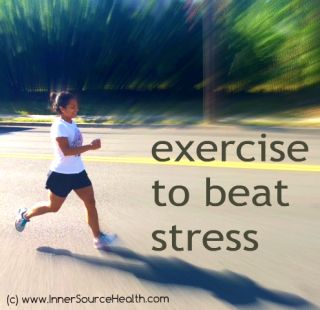
Anxiety
Exercise Your Way Out of Anxiety and Depression?
Primitive solution to a modern problem
Posted August 10, 2015

Moving your body is absolutely crucial when it comes to calming the brain and beating anxiety. It is hard wired into our body to move when stressed. Think about it – in the wild, when under stress or danger (like in the case of running from a bear that is trying to eat you), your primitive brain sets the body up for ‘fight or flight’ response. This will give you a feeling in your body that is akin to drinking a few Red Bulls – surges through your blood vessels (factoid: epinephrine is known as adrenaline in England).
Epinephrine gives you a caffeine-like energy boost, and and another stress hormone called cortisol also shoots up, and directs to be your body’s storage of sugar broken down from it’s stash in the liver and muscles for quick use to run, or fight for your life. Phew!
The physical acts of running or fighting are keys for you to burn that adrenaline and those sugars that are released when you get stressed out. Unfortunately, most of the time, modern day stressors don’t allow you to use your body the way you would in the wild. For example, if you are sitting in traffic and are stressed because you are late and you know the boss is going to nail you – however, you can’t just jump out of the car and run. So you sit there, waiting for the red lights in front of you to finally break up so you can show up late and deal with more stress. Similarly, if you are at a board meeting or sitting in a class, and you are really upset about a text you just received, you have show proper composure and sit - and just simply deal with the flood of adrenaline and sugar that takes over your body when stress hits.
When that flood of sugar and adrenaline hits, and we don’t move vigorously, it will cause anxiety, panic attacks, and will raise blood pressure too. Long term chronic stress, will contribute to inflammation in the body, diabetes, cardiovascular disease, and of course, emotional problems like anxiety, panic attacks, and depression.
Exercise to the Rescue
This is where exercise comes in. Regular exercise will help you burn those stress hormones, use up that released sugar, and make you feel calmer. Exercise has been shown to be very helpful for both depression and anxiety, two situations where stress hormones are often high.
Some studies have even compared exercise to the effect of medications for depression. One randomized controlled trial of 156 adults compared exercise to the antidepressant Zoloft. Researchers learned that the effects of exercise took a little longer to kick in, but the exercise worked just as well as the drug in the long run and showed significantly lower relapse rates (8 percent versus 31 percent) than subjects in the medication group. A second study looked at patients of at least fifty years of age who experienced depression. Researchers recommended that one group of volunteers start a course of exercise, and the other take antidepressant medications. Again, there was quicker improvement in the drug group, but after sixteen weeks, the exercise caught up with equal benefits. Exercise also has good results when used adjunctively with medication to treat anxiety , and is an excellent one- two punch when used with cognitive behavioral therapy (CBT), a type of psychotherapy.
Exercise Protects Your Brain
Exercise has clear benefits for protecting your brain and adrenal (stress) system as well. Research shows that high levels of the stress hormone cortisol beats up your brain—especially the area called the hippocampus. The hippocampus helps us with memory and emotion and will actually shrink down and get smaller when it is exposed to too much cortisol.
Animal studies have demonstrated how exercise can actually reverse this shrinkage – and studies in us humans show this as well. Exercise helps create new brain cells, and can help calm all of us animals when we are overexcited. Recent mouse studies at Princeton University suggest that those animals who exercise not only grow new nerve cells, but also create more brain cells that are able to release calming neurotransmitters, especially GABA, a neurotransmitter that is artificially increased by anxiety drugs like Xanax and Ativan.
What Kind of Exercise Is Best for Anxiety?
It has been shown that pretty much all forms of exercise have been stress-busting, and healthy.
When starting an exercise program, these are points I have my patients keep in mind:
1 - Do something that is fun! If you don’t enjoy it, you probably won’t stick with it.
2 - Start slow if you haven’t exercised before: check in with your doctor to make sure exercise is right for you, and go easy at first. We don’t want you hurting anything, and then stopping exercise for good.
3 - Mix it Up: Studies suggest that a balance of doing both cardiovascular work with strength training (resistance) work probably works better than either alone. Maybe start with one or two days of each.
4 - Get A Trainer: I tell my patients that the money they spend on a trainer will be money they won’t have to spend on visits with me. You haven’t exercised before, learning proper technique is essential to making this work
5 - Try to Get Outside: the anxiety-busting effects of nature and outside endures at least for the day. Exercise alone is wonderful, but the anxiety reduction is even better when you get outside.
6 - Listen to music you love: research shows that listening to great music while you exercise boosts the benefits of exercise.
I Like To Move It Move It
In conclusion, there’s no better ‘drug’ to help lift depression and calm anxiety than exercise to calm stress hormones. Even a half hour a day will go a long way.
about the author: Peter Bongiorno, ND, LAc. is in private practice in New York at Inner Source Health. Dr. Bongiorno authored How Come They’re Happy and I’m Not? The Complete Natural Guide to Healing Depression for Good (Red Wheel). He then authored the practitioner-guide Holistic Therapies for Anxiety and Depression (WW Norton). His upcoming book for the public, Put Anxiety Behind You: The Complete Drug-Free Program is available for preorder on Amazon. Visit drpeterbongiorno.com, InnerSourceHealth.com and join him on twitter @drbongiorno and facebook for updates on naturopathic mental health.
References:
Babyak M, Blumenthal JA, Herman S, Khatri P, Doraiswamy M, Moore K, Craighead WE, Baldewicz TT, Krishnan KR. Exercise treatment for major depression: maintenance of therapeutic benefit at 10 months. Psychosom Med. 2000 Sep-Oct;62(5):633-8.
Blumenthal JA, Babyak MA, Moore KA, Craighead WE, Herman S, Khatri P, Waugh R, Napolitano MA, Forman LM, Appelbaum M, Doraiswamy PM, Krishnan KR. Effects of exercise training on older patients with major depression. Arch Intern Med. 1999;159(19):2349-56.
Anderson E, Shivakumar G. Effects of exercise and physical activity on anxiety.Front Psychiatry. 2013 Apr 23;4:27. doi: 10.3389/fpsyt.2013.00027. eCollection 2013.
Sapolsky RM. Depression, antidepressants, and the shrinking hippocampus.Proc Natl Acad Sci U S A. 2001 Oct 23;98(22):12320-2.
Schoenfeld TJ, Rada P, Pieruzzini PR, Hsueh B, Gould E. Physical exercise prevents stress-induced activation of granule neurons and enhances local inhibitory mechanisms in the dentate gyrus. J Neurosci. 2013 May 1;33(18):7770-7.
please note: the above is not a replacement for medical advice, and anyone with medical concerns should visit a licensed physician



